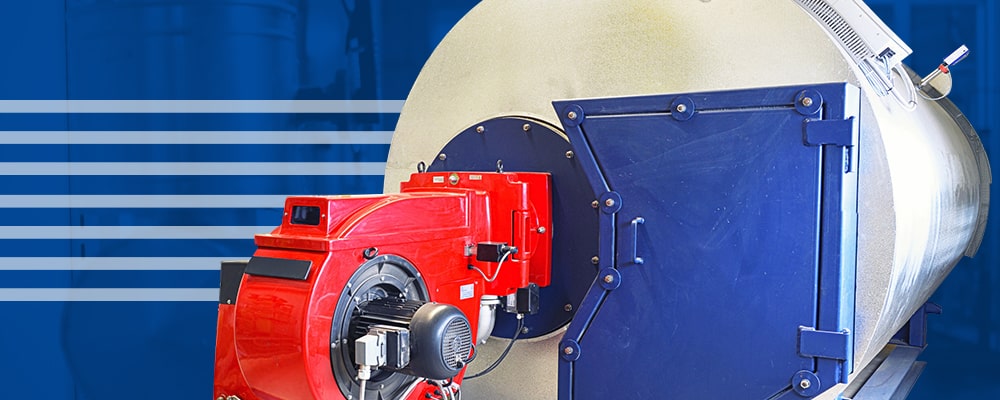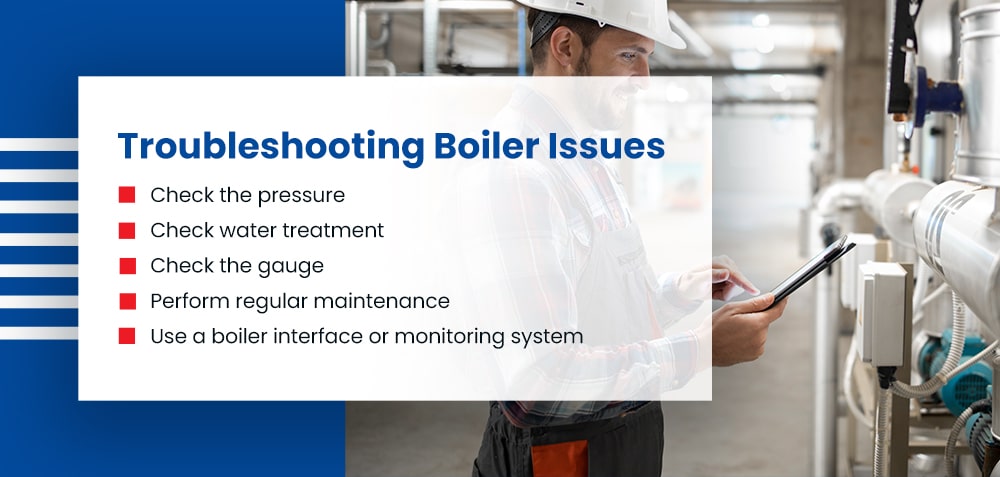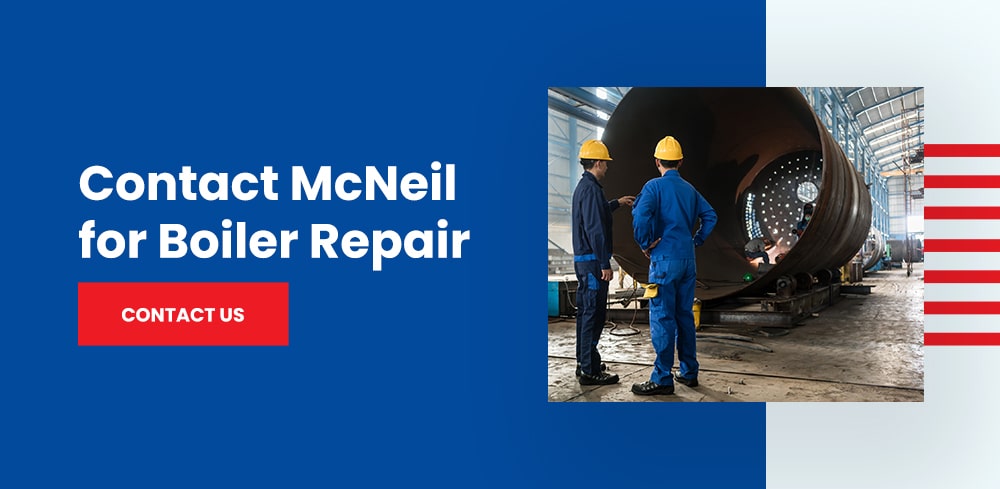Industrial Boiler Troubleshooting

Any industry that utilizes boilers can experience issues that lead to boiler problems, bringing operations to a standstill. All boilers are likely to run into issues from time to time. Knowing what common problems can occur, how to troubleshoot them and what your next steps are can help keep your boiler in good condition.
Common Boiler Problems
While boilers are durable industrial machines, they can still break down if a problem occurs. Responding to boiler problems quickly is essential to minimize damage and save money on repairs. Below are a few of the most common boiler problems you could encounter.
1. Leaking Water
Water leaking from the boiler tank is a sign that the interior of the tank is severely eroded. If your boiler tank has corroded, the only solution is to replace the entire tank. While it’s not the most cost effective solution, it lets you prevent further leaking and additional damage.
Some leaks may be from less severe sources, such as a broken expansion tank or pressure relief valve. These problems are usually easy to fix without eating away at your budget.
You may also encounter water leaks from the pipes or other locations. If you’re using a closed system, you can usually identify the source of the leak with a water meter. A water meter will show dropping water levels, which could drop low enough to shut down the system.
2. Blockages or Scale Buildups
Blockages and buildups are other common boiler problems. Poor water quality can lead to calcium and other minerals accumulating as deposits within the pipes and pressure vessels. These deposits can cause interruptions in the water pathway or, in more extreme circumstances, cause complete blockages.
These blockages can cause you to use more fuel than necessary to run the system and can be expensive to repair if they get severe enough. You can prevent them by using a water treatment system to ensure your water maintains its quality.
3. Weak or Slow-Building Pressure
Weak or slow-building water pressure is a sign of a leak somewhere in the boiler system. Leaks in the system can create a buildup of internal force, creating inconsistencies in the heat distribution and water pressure system. You can check for leaks by looking at the valves or pressure vessels.
Low or no pressure can also indicate an issue with the steam trap or feed pump. You should check these components regularly to ensure they work correctly and provide consistent pressure throughout your boiler system.
4. Strange Noises
Boilers that make strange noises — like whistling or pounding — could indicate significant problems. Strange noises can signal that the water pressure is too low or that there’s excessive buildup on the boiler’s heat exchange.
These problems can cause your boiler to work harder than necessary, leading to backed-up internal pressure. You can prevent this issue by ensuring the air intake, exhaust, gas piping and gas pressure are working correctly.
5. Random Shut Offs
Some of the reasons your boiler could shut off by itself include a broken thermostat, a damaged pump, loss of air pressure or blockages. If your boiler is shutting off or won’t turn on, you should schedule an appointment with a professional heating system expert. They’ll identify the source of the problem and have it repaired as soon as possible.

Troubleshooting Boiler Issues
While a boiler technician will know how to troubleshoot an industrial boiler, you may be able to find the source of some boiler problems yourself. Some ways you can troubleshoot boiler issues include:
- Check the pressure: Some boiler issues only require minor adjustments to the temperature or pressure. However, high pressure can lead to significant problems. The proper setting depends on the boiler’s system and usage. You’ll want to check the requirements for your specific boiler before making any adjustments.
- Check water treatment: You should check the boiler water daily to prevent premature leaks and vessel damage. Catching potential leaks or poor water quality early can help prevent significant issues that can damage your boiler.
- Check the gauge: A faulty gauge can sometimes cause issues in your boiler experience. If your boiler is still reaching the appropriate heat and your building is getting heat as usual, you may only need to replace the gauge. However, you’ll want to ensure you get the appropriate gauge for your building or industrial site’s system and boiler.
- Perform regular maintenance: Regular maintenance is one of the best ways to troubleshoot boiler issues. Keeping up with scheduled inspections and regular tuneups can help you catch problems early, saving you time and money. Periodic maintenance also optimizes your boiler’s performance so it can continue to run smoothly for years to come.
- Use a boiler interface or monitoring system: Some boilers have user-friendly interfaces that keep track of boiler conditions and notify boiler operators if any readings are irregular. The interface will also provide solutions to some problems so you can fix them as soon as possible. A monitoring system can also report on specific information to help you troubleshoot specific issues, allowing you to fix them before they worsen.
Next Steps
Once you identify the problem, the next essential step is to fix the issue and preserve the health of your boiler. If you’ve found a problem with your boiler, you should contact an expert as soon as possible. A professional can help confirm the issue and provide the proper solutions, optimizing your boiler’s performance while preventing expensive repairs. They can also perform boiler repair quickly and efficiently, ensuring that your boiler will continue to serve for as long as possible.
While a professional is vital for essential repairs, performing regular preventive maintenance can reduce how much you need them. Once your boiler problems are resolved, regular maintenance is crucial to prevent additional issues from occurring. While industrial boilers should follow an annual maintenance schedule, you may need additional maintenance depending on your usage.
Contact McNeil for Boiler Repair
If you’re experiencing trouble with your boiler, McNeil can help. We offer boiler repair services to reduce disruptions and improve your boiler’s efficiency. We can help keep your boiler performing its best, whether it’s electric or gas-powered.
Some of our boiler repair services include refractory repair, maintenance and inspections, boiler cleaning, component and vessel repair or boiler replacement. We can even install a new boiler if it’s time for an upgrade or if the damage has made it impossible to use your current boiler. Contact us today to get started with a free quote!




